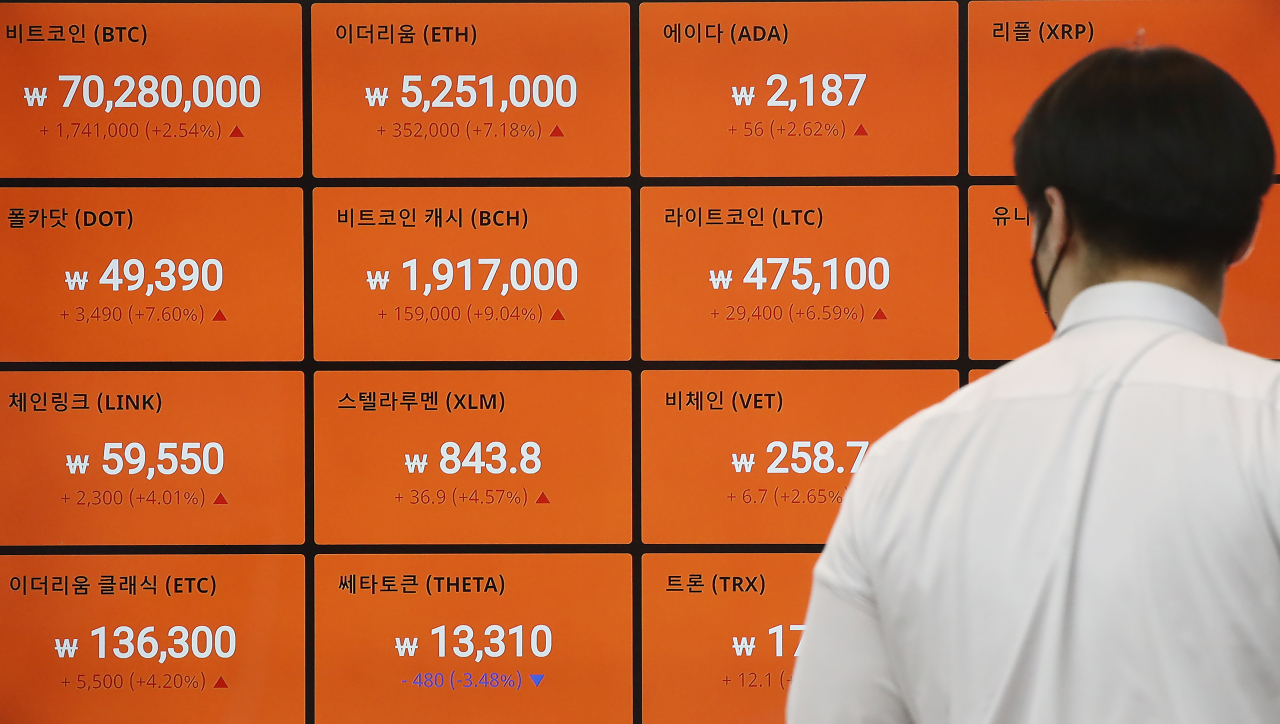 |
A passerby looks at prices of cryptocurrencies including bitcoin on a digital signboard operated by a local cryptocurrency exchange, Bithumb, in Gangnam District, southern Seoul on Wednesday. (Yonhap) |
The Bank of Korea is seeking the authority to monitor cryptocurrency transactions made through users’ real-name bank accounts, a document recently submitted to a lawmaker here by the central bank showed.
“We plan to utilize our legal authority over requesting document submittal from financial institutions to monitor the volume of cryptocurrency transactions made through bank accounts,” the document submitted to Rep. Choo Kyung-ho of the main opposition People Power Party on Wednesday read.
The BOK can request materials from other institutions under Article 87 of the Bank of Korea Act, “when the monetary policy committee deems it necessary for the implementation of its monetary and credit policies.” It has apparently concluded that an unlawful flow of cryptocurrency funds could affect its monetary policies.
If the BOK is legally authorized to do so, the financial authorities are expected to gain stronger monitoring power. At the moment, the policymaking Financial Services Commission is requiring financial institutions and cryptocurrency exchanges to bolster screening of virtual money transactions. The state-run Financial Intelligence Unit has been tracking unlawful flows of funds as well.
On top of it, cryptocurrency exchanges will be required to submit receipts from virtual money trading to the tax authorities, starting next year.
“Cryptocurrency has high price volatility and is a high-risk asset that shifts on issues irrelevant with the real economy,” the BOK explained.
“The market has been growing at a fast pace and this could negatively affect the stability of the financial system,” it added.
Last month, echoing other finance leaders, BOK Gov. Lee Ju-yeol denied cryptocurrency’s utility as a means of exchange, citing its high volatility.
Meanwhile, the crypto market in and out of the country was shaken by US electric automaker Tesla’s announcement that it was ditching Bitcoin as a means of payment.
Following the news, Bitcoin fell as much as 13 percent in the early morning on Thursday from 24 hours earlier.
Amid growing concerns over investors’ insecurity after Tesla's CEO Elon Musk’s decision, some said it wouldn’t hurt the long-term prospects of cryptocurrencies.
“Musk wouldn’t admit it, but because of its volatile character, it was never easy to use Bitcoin as payment, but Musk did a good job in promoting his company as a trendsetter,” said Kim Hyung-joong, the head of Korea University’s Cryptocurrency Research Center.
“Tesla’s decision would not buck the growing acceptance of cryptocurrencies.”
By Park Ga-young (
gypark@heraldcorp.com) & Jung Min-kyung (
mkjung@heraldcorp.com)


![[Herald Interview] 'Korea, don't repeat Hong Kong's mistakes on foreign caregivers'](http://res.heraldm.com/phpwas/restmb_idxmake.php?idx=644&simg=/content/image/2024/11/13/20241113050481_0.jpg)

![[KH Explains] Why Yoon golfing is so controversial](http://res.heraldm.com/phpwas/restmb_idxmake.php?idx=644&simg=/content/image/2024/11/13/20241113050608_0.jpg)



